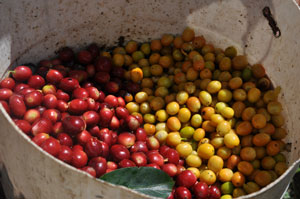Through coffee and the development of the cooperative, ASPROTIMANA has offered the families hope for a better future.
About ASPROTIMANA
 ASPROTIMANA was formed in 2001 as an initiative of 32 producers who were interested in developing more stable marketing channels for its flagship product, coffee, to improve the social and economic position of the families in the area. The social objectives of the project were initially focussed on the coffee farming families but the medium and long term aim is for the benefits to extend more widely through the region as well.
ASPROTIMANA was formed in 2001 as an initiative of 32 producers who were interested in developing more stable marketing channels for its flagship product, coffee, to improve the social and economic position of the families in the area. The social objectives of the project were initially focussed on the coffee farming families but the medium and long term aim is for the benefits to extend more widely through the region as well.
The cooperative is based in the district of Huila and includes 22 villages in the Timana, Elijah and Suaza areas. The cooperative’s name is derived from the Timanaes tribe that originally inhabited the region. Coffee is the main crop, grown on an area of approximately 250 hectares. The majority of the crop is Caturra coffee, but varieties such as Colombia and Castillo are also grown.
Today the association comprises 85 families of small coffee growers who are committed to improving their standard of living by producing and exporting high quality coffee.
The organisation has experience in the marketing of speciality coffee, and meets the standards of Good Agricultural Practices GAP required by importing countries. Through this it has prioritised quality in production processes on members’ small farms. They have won Great Taste awards for two years running.
Benefits of Fairtrade
The cooperative was founded on the principles of economic, social and environmental sustainability and, fundamentally, on absolute quality-led production. Its aim is to invest a considerable part of the premium it receives in the community and in improving the quality of its members’ coffee.
Over 80% of ASPROTIMANA’s coffee production is shade-grown at high altitude, which leads to much higher quality beans and a lower yield. This philosophy of quality over quantity at all times is great for consumers but makes life tough for the farmers.
The Fairtrade Premium – which has paid for schools, a hospital, a warehouse, and even an agronomist to help members improve the quality of their coffee – ensures a fair price that allows them to continue to invest in both their farms’ and their own futures.
They have invested the premium in a number of projects including:
- The construction of a micro factory including a coffee silo.
- A technical assistance programme for the farmers – offering support on better farming practices.
- Revolving Credit – providing the farmers with access to finance to invest in their farms which is otherwise unavailable to them.
- Improving the housing in the area – many of the farms employ seasonal workers for whom they wanted to improve their living conditions.
- Marketing Fund – which is important as the cooperative plays the role of generating increased coffee sales through marketing their coffee to international buyers.
- A Risk Management strategy.
